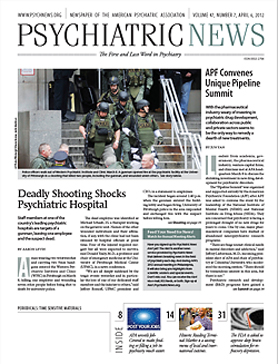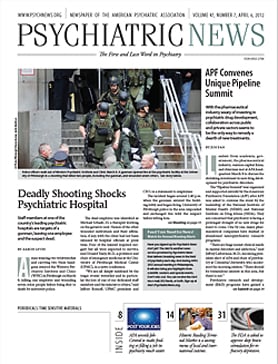The National Institute on Drug Abuse (NIDA) will present a five-session track at the APA annual meeting in Philadelphia. A highlight of the track will be a Tuesday morning presentation of the Addiction Performance Project, an educational theater performance and continuing medical education program presented by NIDAMED, the physicians’ outreach initiative of NIDA (Psychiatric News, September 16, 2011). Two-time Oscar winner Dianne Wiest will play the lead in a dramatic reading of the third act of Eugene O’Neill’s “Long Day’s Journey Into Night,” followed by a panel discussion that will include NIDA Director Nora Volkow, M.D., Charles O’Brien, M.D., Ph.D., and Herbert Kleber, M.D.
The Addiction Performance Project was developed and is produced by Outside the Wire
(www.outsidethewirellc.com), a “social impact company” that uses theater and a variety of media to address public-health issues, such as combat-related psychological injury, end-of-life care, prison reform, and the destigmatization of the treatment of substance abuse and addiction.
The performance will be on Tuesday, May 8, from 11 a.m. to 12:30 p.m. in the Pennsylvania Convention Center’s Terrace Ballroom IV.
The NIDA track begins Saturday afternoon, May 5, when Petra Jacobs, M.D., NIDA’s associate director for program development, will chair “Assessment of Substance Use Disorder (SUD) Patient Outcomes Based on Longitudinal Registry/EMR Data.” The symposium will review methodologies used to assess large registry databases, findings from international databases (European, Australian, and Italian registries), and information about using national Department of Veterans Affairs databases and registries to evaluate care and outcomes for patients with mental disorders, including substance use disorders.
The track will continue Sunday afternoon, May 6, when Cora Lee Wetherington, Ph.D., and Samia Noursi, Ph.D., both of NIDA’s Women and Sex/Gender Research Group, will co-chair “Social Stress and Drug Addiction in Preclinical and Clinical Studies: Sex/Gender Matters in Effects on Brain and Behavior and Treatment Implications.” The symposium will explore gender differences in interactions between several types of social stress and drug addiction in adolescents and adults with a focus on translational implications. As part of this session, Rajita Sinha, Ph.D., a professor in the Department of Psychiatry at Yale University and director of the Yale Stress Center, will discuss the implications of the symposia research findings for understanding gender differences in the etiology of drug abuse as well as for gender-specific drug abuse treatment.
On Monday morning, May 7, Will Aklin, Ph.D., of NIDA’s Division of Clinical Neuroscience and Behavioral Research, will chair the session “Neurobehavioral and Pharmacological Approaches to Target Cognitive Remediation in Drug Addiction,” which will explore how deficits in cognitive functions play an important role in the vulnerability to and progression of drug addiction.
The symposium will provide an overview of ongoing studies that incorporate preliminary evidence of cognitive remediation into clinical trials with pharmacological and behavioral interventions to improve treatment efficacy, retention, relapse prevention, and long-term treatment outcome.
The final symposium, “Dysconnectivity of the Brain in Addiction and Pain,” will be chaired by James Bjork, Ph.D., of NIDA’s Division of Clinical Neuroscience and Behavioral Research. It will focus on how resting-state fMRI offers the opportunity to explore the innate, dynamic functional connectivity between brain structures. Panel members will review the latest data on the effects of pharmacological intervention strategies, such as nicotine patches or analgesics, and provide a framework for the concluding discussion, which will include NIDA Director Nora Volkow, M.D.



